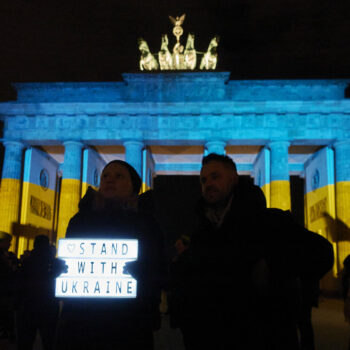Today sees the publication of ‘Delivering Climate Security: International Security Responses to a Climate Changed World’, written by E3G Chief Executive Nick Mabey and published by the Royal United Services Institute (RUSI) as the latest in its series of ‘Whitehall Papers’.
The official publication press release follows below.
RUSI report: Security response to climate change ‘slow and inadequate’
The international response to climate security threats has been ‘slow and inadequate’ and nations need to integrate climate change into their security policy to prepare for worst case scenarios, according to new research from the Royal United Services Institute (RUSI).
Warning that a failure to acknowledge climate change security threats is as dangerous as neglecting the risks of terrorism or nuclear weapons proliferation, the new report – published today (Wednesday 23 April 2008) – also stresses climate security concerns will drive ‘fundamental changes’ to the geo-political landscape, alter how international relations are conducted and force a radical rethink of UK interests.
The RUSI Whitehall Paper, Delivering Climate Security: International Security Responses to a Climate Changed World, calls for ‘dramatically increased investment’ – in line with counter-terrorist spending – to reduce the ‘hard security threats’ driven by climate change which cannot be solved by traditional ‘hard security solutions’. But the report starkly warned that if a ‘crash response’ were needed to react to ‘extreme climate change’, spending would be required on a similar scale to NASA’s Apollo programme.
Outlining a framework for climate security analysis and some of its implications for security policy, practice and institutional change, this paper urges intelligence agencies and the military to ‘not just prepare to respond to the security challenges of climate change; they must also be part of the solution’.
Information on present and future serious climate security impacts is as good, if not better, than other information routinely used in security planning and assessment’, the report argues. ‘If climate change is not slowed and critical environmental thresholds are exceeded, then it will become a primary driver of conflicts between and within states’.
Not only will the security community have a role to play in managing the multiplied challenges of a climate-changed world, but it also has the ‘hard won experience’ of driving forward technological change in the past, argues the report. The security community must therefore also proactively support efforts to radically reduce carbon emissions now as a means of avoiding the ‘worst case scenario’ security implications.
Report author Nick Mabey, Chief Executive of E3G and former senior advisor in the Prime Minister’s Strategy Unit, said:
“In the next decades, climate change will drive as significant a change in the strategic security environment as the end of the Cold War. If uncontrolled, climate change will have security implications of similar magnitude to the World Wars, but which will last for centuries.
“Over the next decades, the determinant of whether climate change drives serious conflicts lies in how political systems respond to the tensions it creates. Too often, analysis of climate change impacts assumes that all governments will act to maximise the common good in response to change…
“In general, climate change could drive a more collaborative approach in inter-state relations or it could exacerbate tensions between and within countries, leading to a ‘politics of insecurity’ as countries focus on protecting themselves against the impact. The pattern of co-operation which arises will depend on how effectively climate change is incorporated into mainstream foreign policy, and succeeds in changing the balance of national interests in major countries across critical security and geo-political issues.
“Climate impacts will force us into a radical rethink of how we identify and secure our national interests. For example, our energy and climate security will increasingly depend on stronger alliances with other large energy consumers, such as China, to develop and deploy new energy technologies, and less on relations with oil producing states. No strategy for long run peace and stability in Afghanistan can possibly succeed unless local livelihoods can survive the impact of a changing climate on water availability and crop yields.
“Achieving security in a climate-stressed world will require a more pro-active and intensive approach to tackling instability in strategically important regions with high climate vulnerability and weak governance…
“The first signs of this response are emerging, but the necessary changes will need to happen much faster than in the past if they are to match the remorseless ecological timetable of a changing climate driven by a dynamic global economy.”
Welcoming the new RUSI report, the Foreign & Commonwealth Office said:
“The Government’s National Security Strategy, published on 19 March 2008, identified climate change as a significant threat to global stability and security and, therefore, to UK national security. We welcome the RUSI report as a helpful addition to the growing debate on climate security. We need urgently to deepen our understanding of the possible country-specific impacts of climate change and how they interact with drivers of insecurity such as weak governance, water stress, economic decline and migration.”
This new RUSI report is released just days after Sir Nicholas Stern warned that the economic effects of climate change are likely to be far worse than his initial 2006 estimate, and against the backdrop of recent food riots on three continents, warnings from the WHO on the health and disease implications of climate change, and new information about looming water shortages from glaciers diminishing much more rapidly than predicted.
NOTES FOR EDITORS
1. RUSI is an independent think-tank for defence and security. RUSI is a unique institution; founded in 1831 by the Duke of Wellington, it embodies nearly two centuries of forward thinking, free discussion and careful reflection on defence and security matters.
2. Nick Mabey is a Founding Director and the Chief Executive of E3G. Until December 2005 he was a senior advisor in the UK Prime Minister’s Strategy Unit leading work on a variety of policy areas, including energy, fisheries, unstable states and organised crime. Also, Nick was previously Head of Sustainable Development in the FCO’s Environment Policy department.
3. E3G is an independent not-for-profit organisation that works in the public interest to accelerate the global transition to sustainable development. More information on E3G’s activities visit www.e3g.org
4. On 3 September 2008 RUSI will host a major conference ‘Security and Climate Change: Incorporating What We Know’, to address practical steps for integrating climate change understandings into security policymaking.
5. RUSI’s Whitehall Papers provide subscribers with in-depth studies of specific developments, issues or themes in the field of national and international defence and security. Published by the Taylor & Francis Group, Whitehall Papers reflect the highest standards of original research and analysis, and are invaluable background material for policy makers and specialists alike.
6. For any other media enquiries please contact Daniel Sherman 020 7747 2617 or 0791773069 or {encode=”daniels@rusi.org” title=”daniels@rusi.org”}


